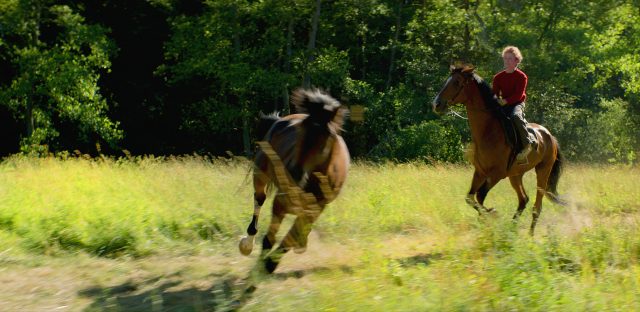Out Stealing Horses: Pony Up, by David Bax

Hans Petter Moland’s Out Stealing Horses (adapted by the director from the novel by Per Petterson) is a pastoral coming of age story. Therefore, it’s light on the superficial whizbangery you might see described as “spectacle.” But Moland is a muscular, graceful filmmaker who thrives at cinematic touches–like a truck barreling down a wintry rural road with walls of snow on either side or a river rushing over and around a logjam–that argue in favor of seeing his movie as big and loud as you can (while staying safely at home, of course).
In a plotline that is too meaty to be called a mere framing device, Stellan Skarsgård plays Trond, a widower in his mid-60s who has moved to a remote part of Norway to, presumably, spend his remaining years mourning his wife in relative solitude. In a growling, almost possessed voiceover, Skarsgård narrates the main story, in which fifteen-year-old Trond (newcomer Jon Ranes, terrific) spends a summer in the same part of the country, felling trees and making lumber with his father (Tobias Santelmann). Out Stealing Horses‘ origins as a novel are apparent in the chapterlike structure that lurches forward and backward in time.
Moland is best known to American audiences for his pitch black comedy Cold Pursuit, the English language remake of his own In Order of Disappearance. He may be working in a less sardonic mode here but Out Stealing Horses is, at times, no less pessimistic in presenting a world that’s every bit as cruel by design as it is beautiful by happenstance. From the stinging nettles that will prick at your skin to toppling trees that may crush you, nature is no paradise. The setting of older Trond’s story is no more cheerful, taking place in 1999 with apocalyptic Y2K fears blaring on the television.
Out Stealing Horses seems to hold an even less sunny disposition toward the males of our species. The older Trond’s narration all but accuses his father of misogyny in describing why the two spent entire summers without his mother or sister. But Trond is not blameless either. The film’s title is not literal; it’s a made-up game young Trond plays with a local boy (Sjur Vatne Brean). With his depiction of men–at multiple ages and in multiple decades–unable to face up to reality, Moland suggests that that’s all men ever do, play pretend. And it’s up to the women of the world to carry the load.
If I’m making Out Stealing Horses sound like a drag, know that’s it actually quite lively. A big part of the credit for that goes to composer Kaspar Kaae, whose score ranges from the staccato strumming of down-tuned guitars to cleverly reappropriating the sound of axes smacking into logs as a percussive element.
That sense of mischief unfortunately peters out in the film’s final stretch, which focuses too much on the ponderous and brooding older Trond. But, until then, Out Stealing Horses is a barbed rejoinder to the optimism of coming of age movies, questioning whether our protagonist ever comes of age at all.




























